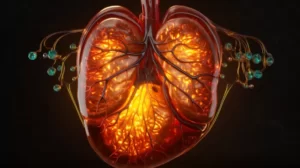More and more Americans are accumulating fat in their livers, a widespread health issue particularly affecting older women. Menopause often results in weight issues related to a decline in estrogen levels, and weight-loss supplements can actually contribute to this problem by leading to extra fat in the liver. This non-alcoholic fatty liver condition is extremely serious, which is why it’s vital for scientists to find healthier ways to reduce fat in the liver.
Menopause and Fat Accumulation
Women who are going through menopause are prone to increased fat storage in their livers. Additionally, their visceral fat – the fat surrounding their organs – also increases, leading to inflammation. Unfortunately, many of the weight-loss supplements currently available target abdominal fat but send that fat to the liver instead. In the liver, the increased fat can cause dangerous inflammation and scarring.
Beneficial Phytonutrients
In order to combat the accumulation of fat in the liver, researchers have turned to the potential benefits of phytonutrients found in specific foods. According to a study by the University of Georgia, four nutrients may help to prevent and eliminate some of the fat from the liver:
- Vitamin D: Known as the sunshine vitamin, vitamin D is naturally produced by our bodies when we are exposed to sunlight. It’s also found in certain foods, such as fatty fish like salmon, mackerel, and tuna; fortified milk, orange juice, and cereal; cheese; and eggs.1 Vitamin D is important for overall health and helps regulate the amount of calcium and phosphate in the body, crucial for maintaining healthy bones, teeth, and muscles.
- Quercetin: This powerful antioxidant can be found in a variety of fruits and vegetables such as apples, onions, berries, and even dark chocolate. Quercetin helps to prevent the release of histamine, a chemical involved in inflammation, and has been found to have anti-inflammatory, antiviral, and anticancer effects. 2
- Resveratrol: Primarily found in the skin of grapes, resveratrol is a powerful antioxidant with a wide range of health benefits. Consumption of resveratrol has been linked to reduced inflammation, lower risk of heart disease, and potential anti-cancer effects. 3
- Genistein: Found in soy products like tofu, soy milk, and edamame, genistein is an isoflavone – a phytoestrogen that mimics the effects of estrogen in the body. It has been shown to help lower the risk of certain types of cancer, improve bone health, and may even reduce the symptoms of menopause. 4
Although individually these nutrients have demonstrated health benefits, the researchers found that when taken together, they have an even more powerful effect in reducing liver fat. This is due to their synergistic influence, leading to more effective results.
Contributing to Better Liver Health
Through their research, the scientists discovered that the introduction of these beneficial phytonutrients in one’s diet essentially helps in dislodging the fat from the liver and sending it elsewhere in the body to be either burned or stored. This process resulted in no liver damage associated with the increased fat. Introducing these nutrients into the daily diet could have long-lasting benefits for liver health, especially for women in menopause who are at risk of developing non-alcoholic fatty liver disease.
Conclusion
The potential health risks of non-alcoholic fatty liver disease in menopausal women are tremendous, making it imperative for health care providers and individuals to find effective solutions to help reduce fat in the liver. Adding these identified nutrients – vitamin D, quercetin, resveratrol, and genistein – to a healthy diet program can potentially contribute to better overall liver health, particularly for women going through menopause. As we continue to understand better how certain nutrients can impact general well-being, incorporating these phytonutrients may help alleviate the threats of non-alcoholic fatty liver disease.



![8 Simple Rules to Refresh Your Body with a Healthy Cleanse [See Pictures]](https://naturalhealthreserve.com/wp-content/uploads/2024/01/8-rules-healthy-cleanse-slideshow-300x168.webp)